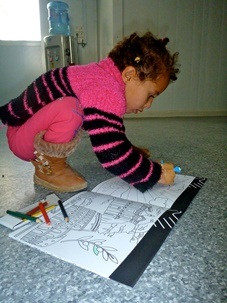Looking around Azraq refugee camp, in Jordan’s north-eastern desert, life seems peaceful, if rudimentary. Children run and play in the camp’s streets, parents shop at the central supermarket, and social and religious activities are growing as refugee families re-establish connections with neighbours. Some Syrian residents can be seen with crutches or other medical equipment, recovering from lingering wounds or long-untreated chronic illnesses.

Other injuries are harder to see, but can have a lasting and devastating impact on the lives of those who suffer from them, and on their families and communities. Some refugees may internalize their trauma, resulting in headaches, stomach aches or insomnia. Others, fearing the stigma of poor mental health, keep their fears to themselves. Many will develop mental and physical health problems that can plague them for years to come. Meeting the mental health needs of a traumatised community is a critical part of providing medical care when serving refugees like those in Azraq.
“We often see patients suffering from depression, where they sometimes find an outlet for their psychological trauma through physical symptoms. We have also treated patients who have harmed themselves or attempted suicide,” says the Finnish Red Cross’ Eeva Matsuuke, the hospital’s head nurse. “The first step to providing psychological first aid is empathetic listening. As a team we have to be prepared to first listen to and then treat people who have lived horrifying experiences.”
The majority of the Red Cross Red Crescent hospital’s patients come from only three cities in Syria: Dara’a, Aleppo and Homs. All three have seen years of intense fighting, sieges or bombings. Many of Azraq camp’s residents have witnessed atrocities or have themselves been victims of violence. Some have lost loved ones, co-workers or neighbours. All here have lost their homes, whether temporarily or permanently, and most have faced a difficult journey to leave Syria, often being displaced within the country for months or years before being forced to start over for a second, third or fourth time as refugees in Jordan.
In order to ensure that those in need of mental health support are identified, treated and followed-up when they return to their families in the camp, staff at the hospital focus on early recognition of mental health needs and continuity of care. “We aim to have a mental health focal point on each hospital shift, to make sure patients get the help they need, and we are training all our medical staff so they can better provide psychosocial support to patients in need” adds Matsuuke. “We also work with the primary care providers in the camp’s villages, so that our patients are discharged into a community that will continue to support them.”
The Azraq hospital for Syrian refugees is supported by the European Commission’s Humanitarian Aid and Civil Protection department (ECHO), and by the governments of Canada and Italy. It is operated by staff from the Canadian, Finnish, German and Norwegian Red Cross societies, along with Jordanian medical, technical and support staff.
For more information about Red Cross Red Crescent efforts in the region, see http://www.redcross.ca/where-we-work/worldwide/middle-east-and-north-africa